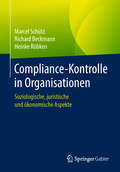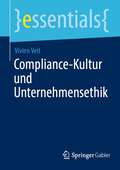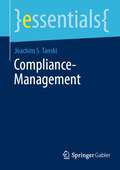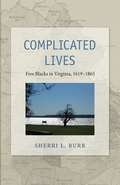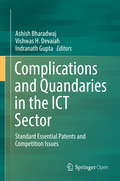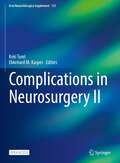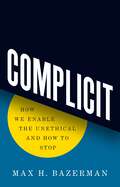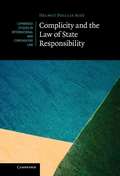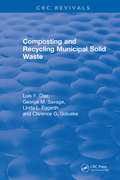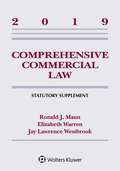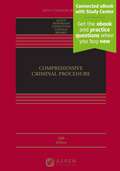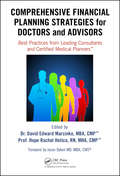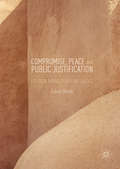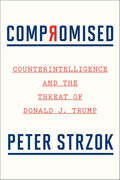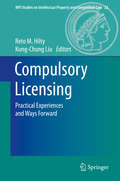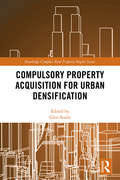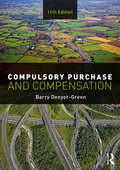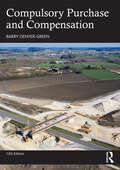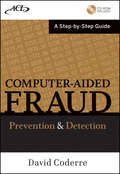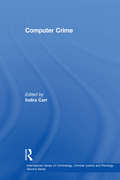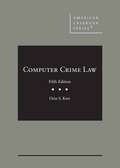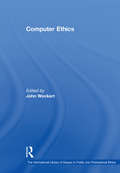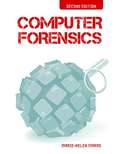- Table View
- List View
Compliance-Kontrolle in Organisationen: Soziologische, juristische und ökonomische Aspekte
by Marcel Schütz Heinke Röbken Richard BeckmannDas Buch bietet eine systematische und interdisziplinäre Darstellung zur Compliance-Kontrolle in Unternehmen, Verwaltungen und weiteren Einrichtungen. Die Autoren befassen sich mit der Diskussion entsprechender Regelwerke bzw. Konzepte sowie den organisatorischen Folgen. Hierzu entwickeln sie sozial-, rechts- und wirtschaftswissenschaftliche Bezüge einer Analyse und Gestaltung organisatorischer Regelsetzung und -begründung. Besonderes Augenmerk gilt dem Spannungsverhältnis formaler und informaler Ordnung sowie dem Ansatz der „brauchbaren Illegalität“. Das Werk richtet sich an mit Compliance-Aspekten beschäftigte Wissenschaftler sowie Experten und Entscheider in Organisationen aller Art.
Compliance-Kultur und Unternehmensethik (essentials)
by Vivien VeitDieses essential beschäftigt sich mit der Frage, was neben einem fundierten Compliance-Management-System nötig ist, um nachhaltig und belastbar eine Kultur der Regeltreue im Unternehmen zu erreichen. Hierzu werden die derzeitigen regulatorischen Ansätze im In- und Ausland sowie Tools und Bausteine vorgestellt, die eine solche Entwicklung begünstigen. Kombiniert mit zahlreichen Statements und konkreten Beispielen und Erfahrungsberichten von Unternehmensvertretern, Beratern und Behördenvertretern entsteht eine Toolbox für Compliance-Verantwortliche, die die Arbeit an individuellen Lösungen erleichtert und darüber hinaus Inspiration für neue Ansätze im eigenen Unternehmen sein kann.
Compliance-Management (essentials)
by Joachim S. TanskiDieses Buch bietet eine komprimierte und praxisorientierte Einführung in die Grundlagen und Anforderungen eines Compliance-Managements, um den Leser schnell mit aktuellen und zentralen Regelungen vertraut zu machen. Dabei wird auf gesetzliche und regulatorische Bestimmungen ebenso eingegangen wie auf betriebswirtschaftliche Notwendigkeiten, um Mitarbeitende und Unternehmen vor den schwerwiegenden Folgen von Compliance-Verstößen zu schützen.
Complicated Lives: Free Blacks in Virginia, 1619-1865
by Sherri BurrWould the United States have developed differently if Virginia had not passed a law in 1670 proclaiming all subsequently arriving Africans as servants for life, or slaves? Complicated Lives upends the pervasive belief that all Africans landing on the shores of Virginia in late August 1619, and thereafter, became slaves. In reality, many of these kidnap victims received the status of indentured servants. Indeed, hundreds of thousands of free African Americans owned property, created businesses, and engaged in public service. Complicated Lives explores the lives of Free Blacks through the lens of the author's ancestors and other Free Blacks who lived this history, including those who served in the integrated troops commanded by George Washington during the Revolutionary War. "Complicated Lives is a much-needed chronicle of the achievements and plight of Free Blacks in America, and how many of our nation's Founding Fathers and notables struggled with the dichotomy of slavery and freedom. This is a scholarly work that belongs on the shelves of all worthy historians, but also reads like a novel, making it approachable to the lay reader." --FRANK ALAN BURR, author of McKinley Memories--A Memoir
Complications and Quandaries in the ICT Sector: Standard Essential Patents and Competition Issues
by Indranath Gupta Ashish Bharadwaj Vishwas H. DevaiahThis book is open access under a CC BY 4. 0 license. With technology standards becoming increasingly common, particularly in the information and communications technology (ICT) sector, the complexities and contradictions at the interface of intellectual property law and competition law have emerged strongly. This book talks about how the regulatory agencies and courts in the United States, European Union and India are dealing with the rising allegations of anti-competitive behaviour by standard essential patent (SEP) holders. It also discusses the role of standards setting organizations / standards developing organizations (SSO/SDO) and the various players involved in implementing the standards that influence practices and internal dynamics in the ICT sector. This book includes discussions on fair, reasonable and non-discriminatory (FRAND) licensing terms and the complexities that arise when both licensors and licensees of SEPs differ on what they mean by " fair", "reasonable" and "non-discriminatory" terms. It also addresses topics such as the appropriate royalty base, calculation of FRAND rates and concerns related to FRAND commitments and the role of Federal Trade Commission (FTC) in collaborative standard setting process. This book provides a wide range of valuable information and is a useful tool for graduate students, academics and researchers.
Complications in Neurosurgery II (Acta Neurochirurgica Supplement #133)
by Keki Turel Ekkehard M. KasperThis Open Access book on Complications in Neurosurgery contains the proceedings of the 2nd ICCN conference held in Mumbai in 2019. The work illustrates and discusses key point of intra- and postoperative complications encountered in brain, spine and peripheral nerve surgery. In addition, this compilation addresses topics in ethics, with further contributions covering medico legal and didactic aspects. It draws from the experience of an international team of experts from all subspecialties in neurosurgery, including oncology, vascular, spine, pediatrics and others. The articles were written by renown specialists in the field who are stepping forward to share their valuable professional experience with colleagues following their joint mission to improve future patient care.
Complicit: How We Enable the Unethical and How to Stop
by Max H. BazermanWhat all of us can do to fight the pervasive human tendency to enable wrongdoing in the workplace, politics, and beyondIt is easy to condemn obvious wrongdoers such as Elizabeth Holmes, Harvey Weinstein, and the Sackler family. But we rarely think about the many people who supported their unethical or criminal behavior. In each case there was a supporting cast of complicitors: business partners, employees, investors, news organizations, and others. And, whether we’re aware of it or not, almost all of us have been complicit in the unethical behavior of others. In Complicit, Harvard Business School professor Max Bazerman confronts our complicity head-on and offers strategies for recognizing and avoiding the psychological and other traps that lead us to ignore, condone, or actively support wrongdoing in our businesses, organizations, communities, politics, and more.Complicit tells compelling stories of those who enabled the Theranos and WeWork scandals, the opioid crisis, the sexual abuse that led to the #MeToo movement, and the January 6th U.S. Capitol attack. The book describes seven different behavioral profiles that can lead to complicity in wrongdoing, ranging from true partners to those who unknowingly benefit from systemic privilege, including white privilege, and it tells the story of Bazerman’s own brushes with complicity. Complicit also offers concrete and detailed solutions, describing how individuals, leaders, and organizations can more effectively prevent complicity.By challenging the notion that a few bad apples are responsible for society’s ills, Complicit implicates us all—and offers a path to creating a more ethical world.
Complicity and the Law of State Responsibility
by Helmut Philipp AustThis systematic analysis of State complicity in international law focuses on the rules of State responsibility. Combining a theoretical perspective on complicity based on the concept of the international rule of law with a thorough analysis of international practice, Helmut Philipp Aust establishes what forms of support for wrongful conduct entail responsibility of complicit States and sheds light on the consequences of complicity in terms of reparation and implementation. Furthermore, he highlights how international law provides for varying degrees of responsibility in cases of complicity, depending on whether peremptory norms have been violated or special subject areas such as the law of collective security are involved. The book shows that the concept of State complicity is firmly grounded in international law, and that the international rule of law may serve as a conceptual paradigm for today's international legal order.
Composting and Recycling Municipal Solid Waste (CRC Press Revivals)
by Luis F. Diaz Clarence G. Golueke George M. Savage Linda L. EggerthComposting and Recycling Municipal Solid Waste is a comprehensive guide that identifies, describes, explains, and evaluates the options available when composting and recycling municipal solid waste (MSW). The book begins with an introductory chapter on the nature of MSW and the importance of solid waste management programs and resource recovery. Chapter 2 discusses MSW storage and collection, with emphasis on recyclables. Chapter 3 examines issues involved in determining the quantity, composition, and key physical characteristics of the MSW to be managed and processed. The book's other chapters cover topics such as the steps required for processing MSW for material recovery, the use of uncomposted organic matter as a soil amendment, composting and use of compost product, the marketing of recyclables, biogasification, and integrated waste management. Composting and Recycling Municipal Solid Waste provides essential information needed by solid waste professionals, consultants, regulators, and planners to arrive at rational decisions regarding available economic and technological resources for MSW composting and recycling.
Comprehensive Commercial Law: 2019 Statutory Supplement (Supplements)
by Elizabeth Warren Ronald J. Mann Jay WestbrookThe Supplement includes the entire Uniform Commercial Code as of May 2019, excluding Article 6, and a selection of other federal statutes and regulations, uniform state laws, and Restatement provisions, aiming to include those items most commonly used in commercial law courses: the Truth in Lending Act, the Electronic Funds Transfer Act, the Federal Tax Lien Act, the Uniform Electronic Transactions Act, excerpts from the CISG, and excerpts from the ICC’s uniform rules for letters of credit. The Bankruptcy Code, as of June 1, 2019, is reproduced in full. Unlike the UCC, there are no official comments for the Bankruptcy Code, and the legislative history is spotty at best. As a result, only the Code is offered here. In addition, selections from Title 18 and Title 28 of the United States Code that are relevant to bankruptcy law are included.
Comprehensive Criminal Procedure (Aspen Casebook)
by Joseph L. Hoffmann Debra A. Livingston Andrew D. Leipold Tracey L. Meares Ronald Jay AllenComprehensive Criminal Procedure, Fifth Edition is perfect for all introductory courses in criminal procedure law (including both investigation and adjudication courses, as well as comprehensive and survey courses). The casebook focuses primarily on constitutional criminal procedure law, but also covers relevant statutes and court rules. The casebook is deliberately challenging--it is designed for teachers who want to explore deeply not only the contemporary state of the law, but also its historical and theoretical foundations. The casebook incorporates a particular emphasis on empirical knowledge about the real-world impacts of law-in-action; the significance of race and class; the close relationship between criminal procedure law and substantive criminal law; the cold reality that hard choices sometimes must be made in a world of limited criminal justice resources; and, finally, the recognition that criminal procedure law always should strive to achieve both fairness to the accused and justice for society as a whole.
Comprehensive Financial Planning Strategies for Doctors and Advisors: Best Practices from Leading Consultants and Certified Medical Planners
by David Edward Marcinko Hope Rachel HeticoDrawing on the expertise of multi-degreed doctors, and multi-certified financial advisors, Comprehensive Financial Planning Strategies for Doctors and Advisors: Best Practices from Leading Consultants and Certified Medical Planners will shape the industry landscape for the next generation as the current ecosystem strives to keep pace.Traditional g
Compromise
by Alin FumurescuThis book offers for the first time a conceptual history of compromise. Alin Fumurescu combines contextual historical analysis of daily parlance and a survey of the usage of the word from the end of the sixteenth century to the beginning of the eighteenth century in both French and English with an analysis of canonical texts in the history of political thought. This book fills a significant gap in the literature about compromise and demonstrates the connection between different understandings of compromise and corresponding differences in understandings of political representation. In addition, Fumurescu addresses two controversial contemporary debates about when compromise is beneficial and when it should be avoided at all costs. A better understanding of the genealogy of compromise offers new venues for rethinking basic assumptions regarding political representation and the relationship between individuals and politics.
Compromise, Peace and Public Justification: Political Morality Beyond Justice
by Fabian WendtThis book explores the morality of compromising. The author argues that peace and public justification are values that provide moral reasons to make compromises in politics, including compromises that establish unjust laws or institutions. He explains how it is possible to have moral reasons to agree to moral compromises and he debates our moral duties and obligations in making such compromises. The book also contains discussions of the sources of the value of public justification, the relation between peace and justice, the nature of modus vivendi arrangements and the connections between compromise, liberal institutions and legitimacy. In exploring the morality of compromising, the book thus provides some outlines for a map of political morality beyond justice.
Compromised: Counterintelligence and the Threat of Donald J. Trump
by Peter StrzokThe “compelling” New York Times bestseller by the FBI counterintelligence agent who opened the investigation into Russian election meddling (The Washington Post).From “the FBI agent who started it all” (David Martin, CBS Sunday Morning), this is an epic, behind-the-scenes account of the biggest counterintelligence story of our time: Russia’s war on American democracy, and the effort to hold Putin’s collaborators to account.When he opened the FBI investigation into Russian meddling in the 2016 presidential election, Peter Strzok had spent over two decades defending the United States against foreign threats. His long career in counterintelligence ended shortly thereafter when he was forced out of the Bureau for privately voicing his political opinions about Donald Trump. But by that time, Strzok had seen more than enough to believe that the country’s new commander in chief had fallen under the sway of America’s adversary in the Kremlin. Now, with a new afterword about the aftermath of Trump’s presidency, Compromised draws on lessons from Strzok’s long career—from his role in the Russian illegals case that inspired the TV series The Americans to his service as lead FBI agent on the Mueller investigation—to construct a devastating account of foreign influence at the highest levels of our government and to reveal the lingering implications for our national security.“This is the book I have been waiting for.” —Rachel Maddow“Peter Strzok stands for an FBI that, whatever its faults, serves the nation rather than a political master. G-men have become the Henry Fondas, the Jimmy Stewarts, of the present day—the true believers in an archaic code.” —The Atlantic
Compulsory Licensing: Practical Experiences and Ways Forward (MPI Studies on Intellectual Property and Competition Law #22)
by Reto M. Hilty Kung-Chung LiuUnder the auspices of the Max Planck Institute for Intellectual Property and Competition Law (now the Max Planck Institute for Innovation and Competition). And Institutum Iurisprudentiae, Academia Sinica, a group of twenty scholars from around the world gathered to study the experiences made with regards to compulsory licensing. The results are demonstrated in this book. Different articles analyze how the international conventions on intellectual property may be interpreted and explore the related doctrinal groundwork surrounding compulsory patent licensing and beyond. It is shown how the compulsory licensing regime could be transformed into a truly workable mechanism facilitating the speedy use and dissemination of innovation and other subject matters of protection.
Compulsory Property Acquisition for Urban Densification (Routledge Complex Real Property Rights Series)
by Glen SearleDensification has been a central method of achieving smart, sustainable cities across the world. This book explores international examples of the property rights tensions involved in attempting to develop denser, more sustainable cities through compulsory acquisition of property. The case studies from Europe, North America, eastern Asia and Australia show how well, or not, property rights have been recognised in each country. Chapters explore the significance of local legal frameworks and institutions in accommodating property rights in the densification process. In particular, the case studies address the following issues and more: Whether compulsory acquisition to increase densification is justified in practice and in theory The specific public benefits given for compulsory acquisition The role the development industry plays in facilitating, encouraging or promoting compulsory acquisition What compensation or offsets are offered for acquisition, and how are they funded? Is there a local or national history of compulsory property acquisition by government for a range of purposes? Is compulsory acquisition restricted to certain types or locations of densification? Where existing housing is acquired, are there obligations to provide alternative housing arrangements? The central aim of the book is to summarize international experiences of the extent to which property rights have or have not been protected in the use of compulsory property acquisition to achieve sustainable cities via urban densification. It is essential reading for all those interested in planning law, property rights, environmental law, urban studies, sustainable urban development and land use policy.
Compulsory Purchase and Compensation
by Barry Denyer-GreenCompulsory Purchase and Compensation is the essential guide to this complex and increasingly relevant area of the law. Now in its eleventh edition, no other book presents the same level of information on the law relating to compulsory purchase and compensation in England and Wales in such an accessible way. The best-selling book on the subject, previous editions have been used by professionals and students alike in order to gain a full understanding of a key subject for any surveyor or lawyer. The book is also especially suited to those coming to this complex subject without a specific background in the law and ideal reading for those students taking planning and built environment law modules. Surveyors in particular will find this book invaluable. This new edition has been extensively revised and reflects the changes to the law in the Housing and Planning Act 2016 and the Neighbourhood Planning Act 2017, and also recent decisions of the courts and the Upper Tribunal, all of which will be of particular interest to those working on cases related to HS2, the proposed high-speed railway line from London to Birmingham, Leeds and Manchester.
Compulsory Purchase and Compensation
by Barry Denyer-GreenCompulsory Purchase and Compensation remains the essential guide to this complex and increasingly relevant area of the law. Now in its 12th edition, no other book presents the same level of information on the law relating to compulsory purchase and compensation in England and Wales in such an accessible way.The book is also especially suited to those coming to this complex subject without a specific background in the law and is ideal reading for those students taking planning and built environment modules. Surveyors in particular will find this book invaluable.Whilst this new edition picks up the very many decisions of the Upper Tribunal and the higher courts since the 11th edition, the principal piece of new legislation is the Levelling-up and Regeneration Act 2023. One of the controversial provisions in the 2023 Act is the power to include in a compulsory purchase order a direction, the effect of which is that in relation to certain limited purposes, compensation shall be assessed on the basis that no planning permission would be granted for development on the relevant land; in effect, no hope value and only existing use values would be paid.
Computer Aided Fraud Prevention and Detection
by David Coderrebecome superhuman." -Richard B. Lanza, President, Cash Recovery Partners, LLC "Computer-Aided Fraud Prevention and Detection: A Step-by-Step Guide helps management and auditors answer T. S. Eliot's timeless question, 'Where is the knowledge lost in information?' Data analysis provides a means to mine the knowledge hidden in our information. Dave Coderre has long been a leader in educating auditors and others about Computer Assisted Audit Techniques. The book combines practical approaches with unique data analysis case examples that compel the readers to try the techniques themselves." -Courtenay Thompson Jr. Consultant, Courtenay Thompson & Associates
Computer Aided Fraud Prevention and Detection
by David CoderrePraise for Computer-Aided Fraud Prevention and Detection: A Step-by-Step Guide "A wonderful desktop reference for anyone trying to move from traditional auditing to integrated auditing. The numerous case studies make it easy to understand and provide a how-to for those?seeking to implement automated tools including continuous assurance. Whether you are just starting down the path or well on your way, it is a valuable resource." -Kate M. Head, CPA, CFE, CISA Associate Director, Audit and Compliance University of South Florida "I have been fortunate enough to learn from Dave's work over the last fifteen years, and this publication is no exception. Using his twenty-plus years of experience, Dave walks through every aspect of detecting fraud with a computer from the genesis of the act to the mining of data for its traces and its ultimate detection. A complete text that first explains how one prevents and detects fraud regardless of technology and then shows how by automating such procedures, the examiners' powers become superhuman." -Richard B. Lanza, President, Cash Recovery Partners, LLC "Computer-Aided Fraud Prevention and Detection: A Step-by-Step Guide helps management and auditors answer T. S. Eliot's timeless question, 'Where is the knowledge lost in information?' Data analysis provides a means to mine the knowledge hidden in our information. Dave Coderre has long been a leader in educating auditors and others about Computer Assisted Audit Techniques. The book combines practical approaches with unique data analysis case examples that compel the readers to try the techniques themselves." -Courtenay Thompson Jr. Consultant, Courtenay Thompson & Associates
Computer Crime (International Library Of Criminology, Criminal Justice And Penology - Second Ser.)
by Indira CarrAlongside its positive impact of providing a global reach, the Internet is prone to a variety of abuses. In the 1990s it was unauthorised access of computers and impairment of the operation of computers through the introduction of viruses and worms that took centre stage. Since then the potential of the Internet for fraudulent activities has been realised by the criminal fraternity and, in recent years, we have seen, for instance, the rise of identity theft and the widespread distribution of offensive and illegal materials. The collection of essays in this volume, while being highly selective, provides a snapshot of the parameters of computer crime, the legal response and discussions surrounding ways to improve the security of cyberspace.
Computer Crime Law
by Orin S. KerrNo area of criminal law and procedure is undergoing more dramatic change, and more exciting developments, than computer crime law. The fifth edition of Kerr’s popular text has the latest cutting-edge material, including many updates since the fourth edition in 2017. New cases and materials address the Supreme Court’s recent decisions in Van Buren v. United States and Carpenter v. United States; new statutes such as the Cloud Act and state laws on nonconsensual pornography; and the latest lower court circuit splits on compelled decryption, the border search exception, private searches of computers, and e-mail scanning. The chapters on computer misuse, the Fourth Amendment, and international evidence collection have been substantially rewritten and reorganized to reflect the latest case law. The book covers every aspect of criminal law in the digital age, and it is presented in an engaging and accessible style. Topics range from computer fraud laws and international computer crimes to Internet surveillance laws and the Fourth Amendment. It is part traditional casebook, part treatise. It both straightforwardly explains the law and presents many exciting and new questions of law that courts are only now beginning to consider. The book is ideally suited either for a 3-credit course or a 2-credit seminar. It will appeal both to criminal law professors and those interested in cyberlaw or law and technology. No advanced knowledge of computers and the Internet is required or assumed. Computer crime law has become an increasingly important area of criminal practice, and this book provides the ideal introduction to the field. Many U.S. Attorney's Offices have dedicated computer crime units, as have many state Attorney General offices. Any student with a background in this emerging area of law will have a leg up on the competition. Students will also find the book easy and fun to read, while professors will appreciate the accessible introduction to an important new field with many open questions for legal scholars. The materials are authored by Orin Kerr, of UC Berkeley Law School, who is widely recognized as the leading academic authority on the law of computer crime.
Computer Ethics (The International Library of Essays in Public and Professional Ethics #No. 4.)
by John WeckertThe study of the ethical issues related to computer use developed primarily in the 1980s, although a number of important papers were published in previous decades, many of which are contained in this volume. Computer ethics, as the field became known, flourished in the following decades. The emphasis initially was more on the computing profession: on questions related to the development of systems, the behaviour of computing professionals and so on. Later the focus moved to the Internet and to users of computer and related communication technologies. This book reflects these different emphases and has articles on most of the important issues, organised into sections on the history and nature of computer ethics, cyberspace, values and technology, responsibility and professionalism, privacy and surveillance, what computers should not do and morality and machines.
Computer Forensics: Cybercriminals, Laws, and Evidence
by Marie-Helen MarasAn Updated Edition of the Definitive Computer Forensics Text. Updated to include the most current events and information on cyberterrorism, the second edition of Computer Forensics: Cybercriminals, Laws, and Evidence continues to balance technicality and legal analysis as it enters into the world of cybercrime by exploring what it is, how it is investigated, and the regulatory laws around the collection and use of electronic evidence. Students are introduced to the technology involved in computer forensic investigations and the technical and legal difficulties involved in searching, extracting, maintaining, and storing electronic evidence, while simultaneously looking at the legal implications of such investigations and the rules of legal procedure relevant to electronic evidence. Significant and current computer forensic developments are examined, as well as the implications for a variety of fields including computer science, security, criminology, law, public policy, and administration.
